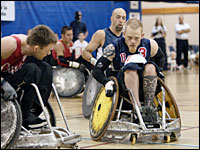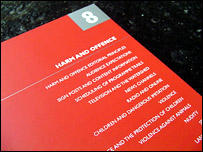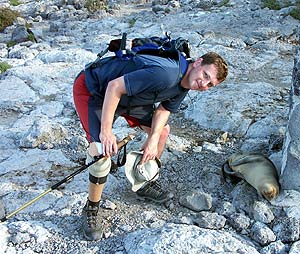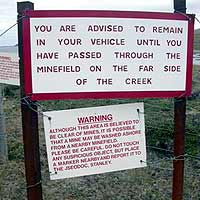I'll write it over the weekend -- and you'll be able to read it first here.
Thursday, June 30, 2005
Reopening this posting, I made a pitch and have been commissioned to write a piece about Murderball for BBC News Online.
I'll write it over the weekend -- and you'll be able to read it first here.
I'll write it over the weekend -- and you'll be able to read it first here.
A diplomatic row is brewing over the allegations in this article.
The claims are not new but they've been strongly denied by Mahmoud Ahmedinejad's office -- and with just eyewitness reports and a few grainy photographs to go on there's a need for some hard documentary evidence to back up the allegations.
UPDATE: The article has subseuently been revised. See this posting.
The claims are not new but they've been strongly denied by Mahmoud Ahmedinejad's office -- and with just eyewitness reports and a few grainy photographs to go on there's a need for some hard documentary evidence to back up the allegations.
UPDATE: The article has subseuently been revised. See this posting.
Wednesday, June 29, 2005
MUSCLING IN

Among the books I read on holiday was Jon Hotten's fascinating Muscle, which explores the freakish subculture of professional bodybuilders.
Among the muscle-bound hulks mentioned in the book is a name I hadn't heard of before -- but I really should have.
At the 2003 Mr Olympia competition, Simon Robinson showed off his pecs, delts and quads for the first time since a road accident which resulted in an above-knee amputation.
He puts pigeon-chested amputees like myself to shame.

Among the books I read on holiday was Jon Hotten's fascinating Muscle, which explores the freakish subculture of professional bodybuilders.
Among the muscle-bound hulks mentioned in the book is a name I hadn't heard of before -- but I really should have.
At the 2003 Mr Olympia competition, Simon Robinson showed off his pecs, delts and quads for the first time since a road accident which resulted in an above-knee amputation.
He puts pigeon-chested amputees like myself to shame.

Still catching up with all the radio I missed during the hols.
The best thing I've heard so far is NPR's interview about the new documentary Murderball -- a film about the world of quadraplegic rugby in the run up to last year's Paralympics.
It's a good listen -- and if the trailer's anything to go by the film has the potential to do much to raise the profile of wheelchair sport.
Subsequently to me posting this, a dialogue has opened:
Hi, Stuart.
My name is Liz DeCastro and I'm the Corporate Communications Director at Iridium Satellite. I came across your blog dated June 22 regarding what sounds like a negative experience you had with your Iridium service while in Quito. Can you tell me more about what happened? I'd like to try to help rectify the situation, if possible.
Best Regards,
Liz DeCastro
Iridium Satellite
Dear Liz,
Thanks for taking the time to e-mail.
My issue with using the Iridium network in Ecuador and the Galapagos Islands was that it simply wasn't reliable enough.
I'd estimate that on around 80% of the occasions I tried dialling numbers (I was dialling people in the UK and US) the calls would not connect. Very often when I did get through the calls would drop off midway through the conversation. The voice quality on calls was also very poor. Whether this may have had anything to do with being right on the Equator I don't know but I found using the Iridium network thoroughly frustrating.
As you may be aware, I work as a World Affairs Producer with BBC News in London. I rely completely on satellite technology to communicate from remote locations and usually use Inmarsat and Thurayas (as you know Thuraya doesn't cover the South America region). I've encountered few of these problems with the other systems.
To give you a real life example. In April 2003, while covering the war in Iraq, I stepped on an anti-personnel landmine which subsequently required my leg to be amputated below the knee. The reliability of the Thuraya network meant my colleagues were able to organise immediate emergency medical aid, inform my family and editors in London and arrange repatriation back to the UK. Such prompt and reliable communications may have saved my life. In a life-or-death situation such as this I was grateful my colleagues did not have to contend with dropped calls or poor call quality.
With all best regards,
Stuart
Staying with the subject of modern communications, while on the Galapagos I picked up a postcard from the barrel in Post Office Bay addressed to a person living near my parents in south Wales.
On my return I forwarded it on and received the following e-mail in reply:
Dear Stuart,
Many thanks for the postcard from my daughter Laura; it arrived this morning, 27th June. Their system seems to work almost as fast as ours and feels even more personal; it's like getting two communications. Thank you and best wishes for your future newsgathering!
I'm not going to make any snide comments about dropping a postcard into a barrel in the middle of the ocean being a more effective form of communication than a satellite phone.
Hi, Stuart.
My name is Liz DeCastro and I'm the Corporate Communications Director at Iridium Satellite. I came across your blog dated June 22 regarding what sounds like a negative experience you had with your Iridium service while in Quito. Can you tell me more about what happened? I'd like to try to help rectify the situation, if possible.
Best Regards,
Liz DeCastro
Iridium Satellite
Dear Liz,
Thanks for taking the time to e-mail.
My issue with using the Iridium network in Ecuador and the Galapagos Islands was that it simply wasn't reliable enough.
I'd estimate that on around 80% of the occasions I tried dialling numbers (I was dialling people in the UK and US) the calls would not connect. Very often when I did get through the calls would drop off midway through the conversation. The voice quality on calls was also very poor. Whether this may have had anything to do with being right on the Equator I don't know but I found using the Iridium network thoroughly frustrating.
As you may be aware, I work as a World Affairs Producer with BBC News in London. I rely completely on satellite technology to communicate from remote locations and usually use Inmarsat and Thurayas (as you know Thuraya doesn't cover the South America region). I've encountered few of these problems with the other systems.
To give you a real life example. In April 2003, while covering the war in Iraq, I stepped on an anti-personnel landmine which subsequently required my leg to be amputated below the knee. The reliability of the Thuraya network meant my colleagues were able to organise immediate emergency medical aid, inform my family and editors in London and arrange repatriation back to the UK. Such prompt and reliable communications may have saved my life. In a life-or-death situation such as this I was grateful my colleagues did not have to contend with dropped calls or poor call quality.
With all best regards,
Stuart
Staying with the subject of modern communications, while on the Galapagos I picked up a postcard from the barrel in Post Office Bay addressed to a person living near my parents in south Wales.
On my return I forwarded it on and received the following e-mail in reply:
Dear Stuart,
Many thanks for the postcard from my daughter Laura; it arrived this morning, 27th June. Their system seems to work almost as fast as ours and feels even more personal; it's like getting two communications. Thank you and best wishes for your future newsgathering!
I'm not going to make any snide comments about dropping a postcard into a barrel in the middle of the ocean being a more effective form of communication than a satellite phone.
Tuesday, June 28, 2005
While slogging around the park this evening (and suffering badly from the consequences of a two-week running layoff while I was on holiday) I listened to a recent episode of Adam Curry's Daily Source Code.
The similarities between Adam's childhood love of radio and mine are uncanny -- our experiments making transmitters with Radio Shack electronics kits so we could broadcast our own shows to the neighbourhood, our excitement about the world of the offshore pirate radio stations and our teenage dabblings with hospital broadcasting.
It's as if we shared parallel anorak-wearing adolescences.
Adam's a geek in the nicest sense of the word -- and sometimes he could use a script editor to tame his logorrhea.
Even so, right now he's one of the leading visionaries in the radio (soon be post-radio?) industry -- and as I've said before his innovations will soon shake my profession to its very foundations.
Apt listening on the day Apple launched its new, podcast-friendly version of iTunes.
The similarities between Adam's childhood love of radio and mine are uncanny -- our experiments making transmitters with Radio Shack electronics kits so we could broadcast our own shows to the neighbourhood, our excitement about the world of the offshore pirate radio stations and our teenage dabblings with hospital broadcasting.
It's as if we shared parallel anorak-wearing adolescences.
Adam's a geek in the nicest sense of the word -- and sometimes he could use a script editor to tame his logorrhea.
Even so, right now he's one of the leading visionaries in the radio (soon be post-radio?) industry -- and as I've said before his innovations will soon shake my profession to its very foundations.
Apt listening on the day Apple launched its new, podcast-friendly version of iTunes.
THE REVISED VERSION
 Weighty tomes are appearing in the in-trays of all of us working in BBC editorial.
Weighty tomes are appearing in the in-trays of all of us working in BBC editorial.
Yep -- it's that soon-to-be bestseller The New BBC Editorial Guidelines, which form "part of our contract with our audiences," according to Stephen Whittle, BBC Controller of Editorial Policy.
The document contains some timely advice to us hacks. For example:
"Any proposal to use the most offensive language (cunt, motherfucker and fuck) must be referred to and approved by a senior editorial figure or for Independents by the commissioning editor and the relevant output controller for television, radio, online and any other service. Chief Adviser Editorial Policy may also be consulted (Source: BBC Editorial Guidelines)
Presumably proposals to use the words "arsewipe," "shitface," "goolies" or "front bottom" can be approved at a more junior editorial level.
 Weighty tomes are appearing in the in-trays of all of us working in BBC editorial.
Weighty tomes are appearing in the in-trays of all of us working in BBC editorial.Yep -- it's that soon-to-be bestseller The New BBC Editorial Guidelines, which form "part of our contract with our audiences," according to Stephen Whittle, BBC Controller of Editorial Policy.
The document contains some timely advice to us hacks. For example:
"Any proposal to use the most offensive language (cunt, motherfucker and fuck) must be referred to and approved by a senior editorial figure or for Independents by the commissioning editor and the relevant output controller for television, radio, online and any other service. Chief Adviser Editorial Policy may also be consulted (Source: BBC Editorial Guidelines)
Presumably proposals to use the words "arsewipe," "shitface," "goolies" or "front bottom" can be approved at a more junior editorial level.
MAKE BOB GELDOF HISTORY
 The whole Live 8 frenzy is getting completely ridiculous.
The whole Live 8 frenzy is getting completely ridiculous.
20 years ago, Live Aid meant two era-defining concerts in London and Philadelphia.
In 2005, however, it means the stadium-rocking McFly in Tokyo and Shikisha (who?) in Cornwall (where?)
As for Sail 8 -- a more utterly pointless way of tackling world poverty it's difficult to imagine (unless you're planning on shipping a few asylum seekers across as stowaways and offering them a new life in the UK).
However, there is one big positive amid this orgy of self indulgence.
Live 8 is putting my brother's adopted hometown firmly on the musical map.
I visited Barrie, Ontario last winter.
It's a lovely place to live and work -- but a throbbing metropolis it ain't.
Surprising, then, to find that Barrie is hosting Canada's Live 8 extravaganza -- although given the line-up I'd strongly advise the good citizens of the city to steer well clear of Park Place this weekend.
 The whole Live 8 frenzy is getting completely ridiculous.
The whole Live 8 frenzy is getting completely ridiculous. 20 years ago, Live Aid meant two era-defining concerts in London and Philadelphia.
In 2005, however, it means the stadium-rocking McFly in Tokyo and Shikisha (who?) in Cornwall (where?)
As for Sail 8 -- a more utterly pointless way of tackling world poverty it's difficult to imagine (unless you're planning on shipping a few asylum seekers across as stowaways and offering them a new life in the UK).
However, there is one big positive amid this orgy of self indulgence.
Live 8 is putting my brother's adopted hometown firmly on the musical map.
I visited Barrie, Ontario last winter.
It's a lovely place to live and work -- but a throbbing metropolis it ain't.
Surprising, then, to find that Barrie is hosting Canada's Live 8 extravaganza -- although given the line-up I'd strongly advise the good citizens of the city to steer well clear of Park Place this weekend.
Monday, June 27, 2005
So much to blog about -- but today's been dominated by the last Big Push between me and the chaps from MAG to get everything nailed down for our planned cycle ride across Death Valley in November.
After a lot of hard work and a few amazing fundraising miracles by the team, we've finally agreed on the dates and the detail and have a proposal to present to potential corporate sponsors.
The support we've already received in the early stages of planning has meant we're close to our original fundraising target of £10,000 -- so we'll just keep raising the bar for as long as people want to keep on giving.
Here 's the proposal in full as a Word document.
To renew my plea, if you're a business person, or are able to sweet-talk/cajole/threaten someone who is, please, please get involved because it's going to be a very exciting project and you'll earn my undying thanks.
Just drop me an e-mail -- and spread the word as widely as you can.
We'll also be seeking donations from individuals and you'll be able to donate online when the special website goes live in a couple of weeks. Details to follow.
After a lot of hard work and a few amazing fundraising miracles by the team, we've finally agreed on the dates and the detail and have a proposal to present to potential corporate sponsors.
The support we've already received in the early stages of planning has meant we're close to our original fundraising target of £10,000 -- so we'll just keep raising the bar for as long as people want to keep on giving.
Here 's the proposal in full as a Word document.
To renew my plea, if you're a business person, or are able to sweet-talk/cajole/threaten someone who is, please, please get involved because it's going to be a very exciting project and you'll earn my undying thanks.
Just drop me an e-mail -- and spread the word as widely as you can.
We'll also be seeking donations from individuals and you'll be able to donate online when the special website goes live in a couple of weeks. Details to follow.
Sunday, June 26, 2005
The New York Times reports on the latest prosthetic technology.
Professor Sherry Turkle from MIT's Initiative on Technology and Self reckons it's becoming cool to be an amputee:
"There is a kind of cyborg consciousness, a fluidity at the boundaries of what is flesh and what is machine, that has happened behind our backs," she says.
"The notion that your leg is a machine part and it is exposed, that it is an enhancement, is becoming comfortable in the sense that it can be made a part of you."
Hmmm...I'll bear the fluidity at the boundaries of what is flesh and what is machine in mind the next time I'm left hobbling and limping because my stump is injured.
Professor Sherry Turkle from MIT's Initiative on Technology and Self reckons it's becoming cool to be an amputee:
"There is a kind of cyborg consciousness, a fluidity at the boundaries of what is flesh and what is machine, that has happened behind our backs," she says.
"The notion that your leg is a machine part and it is exposed, that it is an enhancement, is becoming comfortable in the sense that it can be made a part of you."
Hmmm...I'll bear the fluidity at the boundaries of what is flesh and what is machine in mind the next time I'm left hobbling and limping because my stump is injured.
Friday, June 24, 2005

Is my sadistic pleasure in watching thousands of Glastonbury festival-goers drown amid torrential downpours, while I watch the event in surround sound at home on my widescreen TV, the final piece of evidence (as if it were needed) that I'm fast approaching middle age?

Well that trip's going to take some beating.
Thanks to the people at Enchanted Expeditions I got to see, close enough to touch (not that I did, of course)...marine iguanas, land iguanas, lava lizards, sally lightfoot crabs, yellow warblers, American oystercatchers, blue footed boobys, Galapagos giant tortoises, large painted locusts and, of course, sea lions -- hundreds and hundreds of sea lions.
And those were just the species that were moving slowly enough for me to photograph them (OK, so the tortoises weren't exactly difficult to keep up with.)
The Galapagos are a truly magical group of islands -- a place that everyone with even a passing interest in natural history or the environment should visit at least once before they die.
Read much more about these amazing islands here.
Wednesday, June 22, 2005
Back in Quito....and thanks to the uselessness of the Iridium network I was unable to file the promised audioblogs from the Galapagos.
I´m flying back to London tomorrow, from where I´ll bore you all senseless with my wildlife photos.
I´m flying back to London tomorrow, from where I´ll bore you all senseless with my wildlife photos.
Sunday, June 12, 2005

I'm heading to South America this evening for the trip of a lifetime to the Galapagos Islands.
Blogging will be suspended for the next fortnight, although I'm hoping to file a few audioblog posts while I'm there.
Bring on the boobys!
Saturday, June 11, 2005
Following on from this posting, the Radio 1Xtra documentary "Hip Hop in the Holy Land" was a winner.

The Guardian reports on a novel idea being put forward by Falkland Islanders.
Although hundreds of acres of land in the Falklands are off-limits because of mines, the minefields are well marked and therefore cause few problems. In addition, the mined land is of poor quality for farming.
Yet under the Ottawa Treaty the UK is obliged to ensure the destruction of all anti-personnel mines in the Falklands by no later than 1 March 2009.
So rather than spending money clearing mines that aren't endangering lives and limbs, the Falklanders are instead asking the British government to remove mines from an equivalent land area in a country such as Angola or Cambodia, where the lethal munitions present a daily risk to life.
Simon Conway from Landmine Action explains the thinking behind the "mine clearance credit" initiative.
The plan would seem to have some merit because it addresses one of the central issues in the anti-landmine campaign.
Ridding the world of every single landmine is a laudable aim, but it's a waste of money if some of those landmines aren't causing any problems.
Better to clear 10 landmines around a well that is the only source of water for an entire Cambodian village than clear 1000 mines on a remote piece of scrub land in the Falkland Islands.
Three years since his last visit, Hoder is planning a trip back to his native Iran.
Hossein is timing his visit to coincide with next week's presidential elections which, had I not been about to go to South America, I'd have gone to Tehran to cover.
He's asking the blogosphere to help fund his trip and, perhaps more importantly, to raise awareness of his visit in case he runs into problems with the authorities while he's there.
I wish him a safe and successful journey.
(Hear my recent conversation with Hossein here.)
Hossein is timing his visit to coincide with next week's presidential elections which, had I not been about to go to South America, I'd have gone to Tehran to cover.
He's asking the blogosphere to help fund his trip and, perhaps more importantly, to raise awareness of his visit in case he runs into problems with the authorities while he's there.
I wish him a safe and successful journey.
(Hear my recent conversation with Hossein here.)
That Queen's birthday honouree -- an OBE for Frank Gardner for services to journalism.
Friday, June 10, 2005
A certain friend of this blog will be decorated in this year's birthday honours list (no, it's not me).
It's all strictly embargoed until tomorrow but we'll be celebrating the news with him (or maybe her -- I can't say) this afternoon.
It's all strictly embargoed until tomorrow but we'll be celebrating the news with him (or maybe her -- I can't say) this afternoon.
I've just finished watching the epic documentary series Auschwitz - The Nazis And The Final Solution, which I bought after visiting Auschwitz-Birkenau while covering the Pope's death from Poland a couple of months ago.
The engrossing series is a searing reminder of man's capacity for unimaginable acts of inhumanity against fellow man.
It would be comforting to consign the horrors of Auschwitz to history -- but from Cambodia to Darfur, crimes against humanity continue.
One of the most striking statistics in the Auschwitz series is that 90% of the SS troops who worked at the camp were never called to account for their crimes.
In a few weeks time I'll go on assignment to Bosnia for the tenth anniversary of the Srebrenica massacre -- Europe's worst massacre since World War II.
A decade on, the alleged architect of the massacre, Ratko Mladic, is still free.
History repeats itself.
The engrossing series is a searing reminder of man's capacity for unimaginable acts of inhumanity against fellow man.
It would be comforting to consign the horrors of Auschwitz to history -- but from Cambodia to Darfur, crimes against humanity continue.
One of the most striking statistics in the Auschwitz series is that 90% of the SS troops who worked at the camp were never called to account for their crimes.
In a few weeks time I'll go on assignment to Bosnia for the tenth anniversary of the Srebrenica massacre -- Europe's worst massacre since World War II.
A decade on, the alleged architect of the massacre, Ratko Mladic, is still free.
History repeats itself.
Thursday, June 09, 2005
Reopening this posting, the Downing Street memo gets yet more coverage today.
Salon's Eric Boehlert is bang on the money:
"The memo story epitomizes a mainstream press corps that is genuinely afraid to ask tough questions and write tough stories about the Bush administration.
"Worse, in the case of the Downing Street memo, it simply refuses to report on the existence of a plainly newsworthy document."
Jim Cox from McNewspaper USA Today admits he missed a trick:
"I wish we'd had something in early on, and I wish we'd been able to move the memo story forward. I feel like we missed an opportunity, and that's my fault."
Salon's Eric Boehlert is bang on the money:
"The memo story epitomizes a mainstream press corps that is genuinely afraid to ask tough questions and write tough stories about the Bush administration.
"Worse, in the case of the Downing Street memo, it simply refuses to report on the existence of a plainly newsworthy document."
Jim Cox from McNewspaper USA Today admits he missed a trick:
"I wish we'd had something in early on, and I wish we'd been able to move the memo story forward. I feel like we missed an opportunity, and that's my fault."
My colleague Nick Bryant has been reporting from Afghanistan on the horrific legacy of landmines.
Watching his TV report (which sadly isn't available online) brought back lots of painful memories for me; the helicopter evacuation to the hospital, the devastating decision to amputate, and the start of the long road to rehabilitation.
Even though the girl Nick followed was one of the lucky ones -- she survived the explosion -- her future can at best be described as uncertain.
The needs of the vast majority of Afghanistan's mine victims are not being met.
In another life, in another country, it could have been me.
Watching his TV report (which sadly isn't available online) brought back lots of painful memories for me; the helicopter evacuation to the hospital, the devastating decision to amputate, and the start of the long road to rehabilitation.
Even though the girl Nick followed was one of the lucky ones -- she survived the explosion -- her future can at best be described as uncertain.
The needs of the vast majority of Afghanistan's mine victims are not being met.
In another life, in another country, it could have been me.
FIRST PERSON PLURAL

Channel 4 aired a landmark documentary -- Being Pamela -- last night about a woman with dissociative identity disorder.
It was a sensitively-handled, if unsettling, piece of work that's sure to do well on the awards circuit.
But the programme nearly didn't make it on air at all.
Pamela Edwards' local authority, St Helens Council, sought a High Court injunction to prevent the publication of any details about her life. Thankfully, they lost.
It's a bitter irony.
One of the central issues in the documentary was the way the social services utterly failed Pamela during her early life, leaving her to endure the years of horrendous abuse that probably triggered her disorder.
Three decades on St Helens Council went to court, claiming they wanted to look after her best interests.
It's a little bit late for that.

Channel 4 aired a landmark documentary -- Being Pamela -- last night about a woman with dissociative identity disorder.
It was a sensitively-handled, if unsettling, piece of work that's sure to do well on the awards circuit.
But the programme nearly didn't make it on air at all.
Pamela Edwards' local authority, St Helens Council, sought a High Court injunction to prevent the publication of any details about her life. Thankfully, they lost.
It's a bitter irony.
One of the central issues in the documentary was the way the social services utterly failed Pamela during her early life, leaving her to endure the years of horrendous abuse that probably triggered her disorder.
Three decades on St Helens Council went to court, claiming they wanted to look after her best interests.
It's a little bit late for that.
Wednesday, June 08, 2005
It's handbags at dawn between my old compadre Chuck Olsen and producer John Hart.
Hey -- play nice, fellas.
Chuck's been around a long time and surely the blogosphere's big enough for two...er....blogumentaries.
Bring back the good old days of Big Media before everything got all open source and bottom-up -- back then you could sue someone for copyright infringement.
(Via Jeff)
Hey -- play nice, fellas.
Chuck's been around a long time and surely the blogosphere's big enough for two...er....blogumentaries.
Bring back the good old days of Big Media before everything got all open source and bottom-up -- back then you could sue someone for copyright infringement.
(Via Jeff)
Very odd to see the so-called "Downing Street Memo" is gaining renewed traction in the American blogosphere.
This more than a month after the story was covered here in the UK.
Perhaps if some sections of the American media pulled their heads out of their backsides and read something other than the Washington Post and the New York Times they might pick up a decent story every once in a while.
This more than a month after the story was covered here in the UK.
Perhaps if some sections of the American media pulled their heads out of their backsides and read something other than the Washington Post and the New York Times they might pick up a decent story every once in a while.
Serve your country -- wreck your marriage.
Once in a blue moon, something comes along that makes you think "Aha! -- So that's what the future's going to be like."
Inspired by the BBC's podcast trial (which, while interesting, is still far too limited in scope,) I decided to look slightly further afield for some "amateur" podcasts to sample.
Where else to start but with the Podfather himself, Adam Curry.
I know I'm way behind the curve on this, but as a radio producer myself Curry's podcast came as something of a revelation. It's a genuinely "broadcast quality" programme produced by a talented broadcaster with something to say.
I was chatting recently with a producer from The World At One, who'd never heard of podcasting.
I tried to explain.
"What," he asked incredulously, "you mean that before long people won't be tuning in at set times to listen to the news?"
"No," I replied. "They'll create their own radio station by downloading their favourite podcasts to their MP3 player before they leave for work. They'll listen to them on the train or in the gym at a time that suits them."
It was as if I'd just told Aristotle that the Earth wasn't the centre of the universe.
Once Adam Curry's Castblaster and the and the new version of iTunes come on stream, podcasting will explode.
A lot of what's produced will be inconsequential rubbish.
But the best and most creative elements will shake up the radio industry for years to come.
Now, if I can just find someone who'll pay my salary so I can give up the day job and start that one-man podcasting content cottage industry.
Inspired by the BBC's podcast trial (which, while interesting, is still far too limited in scope,) I decided to look slightly further afield for some "amateur" podcasts to sample.
Where else to start but with the Podfather himself, Adam Curry.
I know I'm way behind the curve on this, but as a radio producer myself Curry's podcast came as something of a revelation. It's a genuinely "broadcast quality" programme produced by a talented broadcaster with something to say.
I was chatting recently with a producer from The World At One, who'd never heard of podcasting.
I tried to explain.
"What," he asked incredulously, "you mean that before long people won't be tuning in at set times to listen to the news?"
"No," I replied. "They'll create their own radio station by downloading their favourite podcasts to their MP3 player before they leave for work. They'll listen to them on the train or in the gym at a time that suits them."
It was as if I'd just told Aristotle that the Earth wasn't the centre of the universe.
Once Adam Curry's Castblaster and the and the new version of iTunes come on stream, podcasting will explode.
A lot of what's produced will be inconsequential rubbish.
But the best and most creative elements will shake up the radio industry for years to come.
Now, if I can just find someone who'll pay my salary so I can give up the day job and start that one-man podcasting content cottage industry.
Mark e-mails with news of Paul Hockey, an Australian arm amputee who has just summited Everest -- although it sounds like the expedition has taken its toll on the 39-year old.
Monday, June 06, 2005

Our friend and colleague Simon Cumbers was murdered a year ago today in Saudi Arabia.
Frank Gardner is in a wheelchair following injuries sustained in the shooting.
They're both in our thoughts today.
Friday, June 03, 2005
Does Sarah Vowell have the most annoying voice in America?
My Audible subscription pick for this month was her new audiobook Assassination Vacation.
Very bad choice.
While I share her obvious love of the medium of radio, Vowell's voice, with its grating, upward-infecting-at-the-end-of-each-sentence timbre, makes her sound like that overly self-assured, hyper-ambitious English student you hated when you were at university.
Come to think of it, she writes like that overly self-assured, hyper-ambitious English student you hated when you were at university as well. I'm willing to bet she edited the college newspaper.
After 40 minutes of her audiobook I could bear no more.
My Audible subscription pick for this month was her new audiobook Assassination Vacation.
Very bad choice.
While I share her obvious love of the medium of radio, Vowell's voice, with its grating, upward-infecting-at-the-end-of-each-sentence timbre, makes her sound like that overly self-assured, hyper-ambitious English student you hated when you were at university.
Come to think of it, she writes like that overly self-assured, hyper-ambitious English student you hated when you were at university as well. I'm willing to bet she edited the college newspaper.
After 40 minutes of her audiobook I could bear no more.
A fact writer at Fox News?
Whatever for?
I can only assume that because facts are such a rare commodity at Fox they need a separate person just to write them.
Whatever for?
I can only assume that because facts are such a rare commodity at Fox they need a separate person just to write them.
Thursday, June 02, 2005
The One World Media Awards are announced shortly.
After looking through the finalists I decided to take a listen to the radio documentary Hip Hop in the Holy Land, broadcast on digital station 1Xtra.
It's a fascinating, tightly-written piece of work which doesn't assume an in-depth knowledge of the Middle East conflict, yet doesn't patronise the audience.
It'd be a worthy award winner.
After looking through the finalists I decided to take a listen to the radio documentary Hip Hop in the Holy Land, broadcast on digital station 1Xtra.
It's a fascinating, tightly-written piece of work which doesn't assume an in-depth knowledge of the Middle East conflict, yet doesn't patronise the audience.
It'd be a worthy award winner.
Wednesday, June 01, 2005
Two very different war stories in the papers today.
Blogger and NBC correspondent Kevin Sites talks to the Guardian about his now-famous footage of a US marine shooting dead an injured Iraqi in Falluja.
Sites touches on the problem at the heart of the practice of embedding journalists with military units -- that of maintaining the distance between reporter and reported:
"I wasn't thinking clearly as a journalist," he says.
"I was still feeling part of a unit, part of some people who have just been embroiled in some serious conflict. I was heartsick because I just knew that this wasn't good for anybody, not for the guy who got shot, not for that marine, not for me."
On a lighter note, Chris Ayres of The Times swaps Rodeo Drive for the road to Baghdad in an extract from his new book War Reporting For Cowards, which looks well worth a read.
Blogger and NBC correspondent Kevin Sites talks to the Guardian about his now-famous footage of a US marine shooting dead an injured Iraqi in Falluja.
Sites touches on the problem at the heart of the practice of embedding journalists with military units -- that of maintaining the distance between reporter and reported:
"I wasn't thinking clearly as a journalist," he says.
"I was still feeling part of a unit, part of some people who have just been embroiled in some serious conflict. I was heartsick because I just knew that this wasn't good for anybody, not for the guy who got shot, not for that marine, not for me."
On a lighter note, Chris Ayres of The Times swaps Rodeo Drive for the road to Baghdad in an extract from his new book War Reporting For Cowards, which looks well worth a read.

